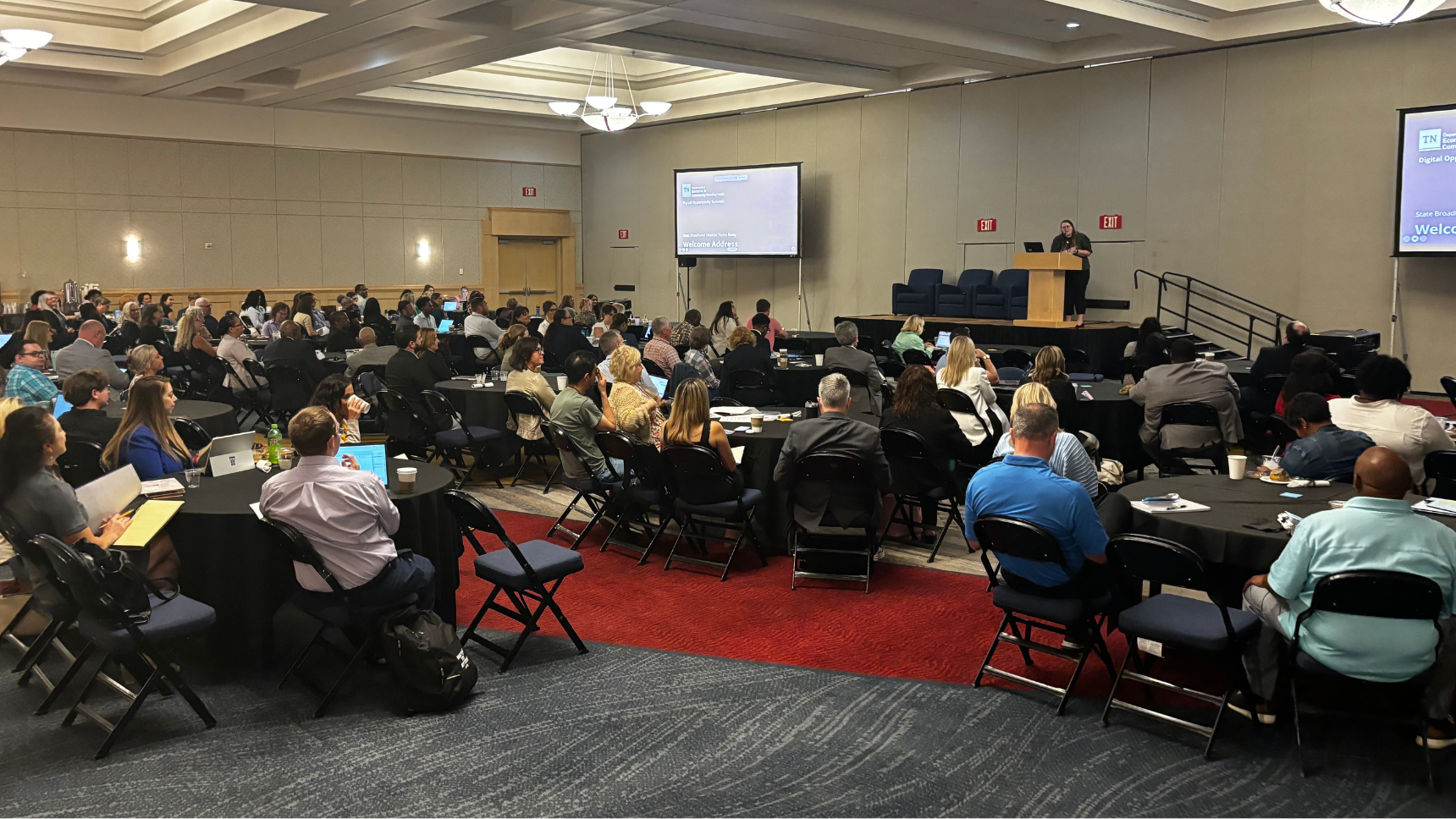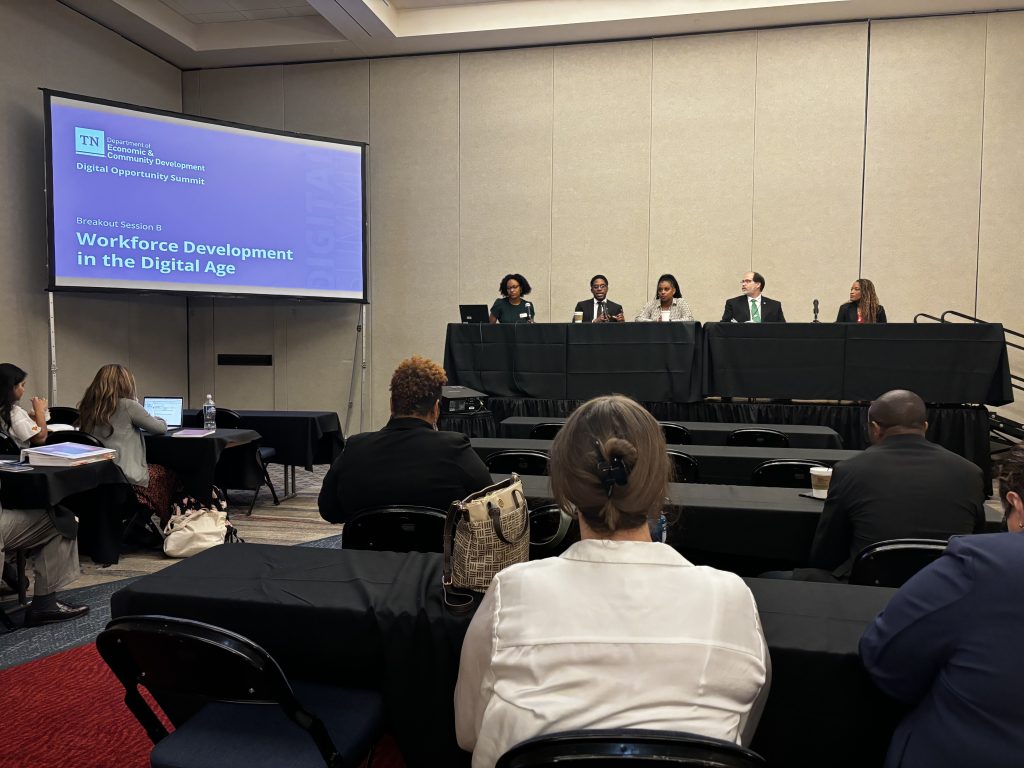
Digital Opportunities: Creating a more accessible state for everyone
TNECD is working to secure an additional $15.8 million in federal funds to support programs and address needs identified in Tennessee’s Digital Opportunity Plan.
“I constantly brag about Tennessee on a national level. This state is so intentional, strategic, and collaborative when we are united on something,” said Nakeisha Ricks-PettyJohn, who is a Senior Fellow at the National Skills Coalition.
She was a featured speaker on a panel discussing workforce development at the annual Digital Opportunities Summit.
About half a dozen workshops and panels broke out throughout the day on Tuesday. The event was organized by the Tennessee Department of Economic and Community Development’s (TNECD) Broadband Office.
This year it was hosted in Chattanooga as an homage to the Gig City’s strategic efforts when it comes to broadband and internet accessibility. The focus of the conference was to provide pathways for more people to get involved in broadband initiatives.
Progress on Broadband Initiatives
Broadband is essentially high-speed internet – and the state has a goal to make it accessible to every Tennessean by 2028. According to officials, they’re well on their way to accomplishing that goal.
“Our state has been nationally recognized for our strategies in getting this area online and connected to resources,” said Taylre Beaty, the state’s Broadband Director.
The Broadband Office has been working fast to close the gaps. In 2020, more than 20 percent of Tennesseeans lacked broadband access, today that number is down to one point four percent. Much of this has been made possible through the help of state and federal grants, non-profits, and internet service providers collaborating for the greater good.
So far, the office has awarded $703 million in grants to more than 138,000 locations across the state. To continue the efforts, TNECD is gearing up to award an additional $813 million in grants in 2025 to assist the expensive work of getting even the most remote, rural, mountainous towns connected.
Why does it matter?
This question was asked of participants and many stories were shared amongst the group.
From a human perspective, seniors may struggle with aging in place if they don’t have any knowledge of technology, devices, or access to the internet. In fact, in some rural cases not being able to access telehealth resources could mean the difference between life and death.
Children who grow up in a rural area without access to the internet and devices could quickly fall behind their peers academically across the state, later affecting their ability to attend secondary school, and/or obtain high-paying employment.
From a professional perspective, access to broadband matters for workforce development. That’s what Nakeisha Ricks-PettyJohn’s panel discussed at the summit.
According to the panel and research collected by Nye Hodge at the Federal Reserve Bank of Atlanta, 92 percent of jobs in the United States require at least one digital skill. Meaning, that only eight percent of jobs require no digital skills.
“Digital skills directly correlate with more pay. Data shows that having five digital skills can help someone make 41 percent more money,” Hodge said. “So, there is a return on investment when we invest in those skills. There’s also a big benefit to existing employees when we upscale their skills.”
From a wider perspective, remote workers are another category of people who are affected by high-speed internet. Each year, more people are trading in-person jobs for fully-remote or hybrid positions; which means the internet connection from home has to be stronger than ever before.
“We need to be able to support those remote workers connectivity-wise, because this is the younger generation and we want them to stay in our state and communities,” said Aaron Lamey, the Chief Executive Officer (CEO) of Tech901, who was also on the workforce panel. “We need those young people to build their lives here, have families here, and spend their dollars in our local economies.”
How data can drive change
Someone in the crowd asked how that data could be used to write grants in smaller, more rural communities where quantitative data is more difficult to collect.
“In such cases, that’s when we lean on qualitative data and share personal stories from the community. Those voices can be the driving force behind community change,” Ricks-PettyJohn said. “Data is important, but stories are data points with a soul.”

She said that Tennessee’s ability to share stories, collaborate, and lean on data as a catalyst for change is what makes the state unique in the national scope of broadband and internet equity.
“We have been able to take this data that Nye helped put together and present it to policymakers, who have made actual changes,” Ricks-PettyJohn said.
This data has led to new grants, internet education courses through Tech Goes Home TN, devices, and new partnerships between for-profits, non-profits, internet service providers, and government entities.
What is next for the Broadband Office?
TNECD is currently administering five programs to implement Tennessee’s vision for Digital Opportunity.
1. Digital Skills, Education, and Workforce Development Grants Program (DSEW) – 50 projects in 74 counties providing digital skills and workforce training to 28,040 people.
2. Connected Community Facilities (CCF) – 20 projects in 19 counties serving 170,180 Tennesseans and providing access to state-of-the-art technologies, education, digital skills training, and telehealth services.
3. Broadband Ready Communities Program – 64 projects in 64 counties providing digital skills training, devices, and public Wi-Fi to Tennesseans.
4. Training Opportunities for the Public (TOP) – Managed by Tennessee State Library and Archives, these funds support new equipment and digital skills training for public libraries.
5. Tennessee College of Applied Technology – Supporting the training of future broadband infrastructure professionals at 5 TCAT campuses.
Like what you've read?
Forward to a friend!

